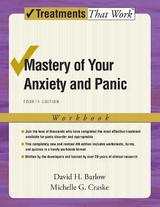
Mastery of Your Anxiety and Panic (MAP-3): Client Workbook for Anxiety and Panic
Oxford University Press Inc (Verlag)
978-0-19-518697-0 (ISBN)
- Titel erscheint in neuer Auflage
- Artikel merken
Map-III is a systematic cognitive-behavioral program, which uses behavioral self-monitoring to increase awareness of circumstances that trigger panic symptoms. Clients learn specific intervention skills, including how to slow down physiological reactivity through breathing retraining and muscle relaxing training; how to de-catastrophise through actual prediction testing; and how to lessen fearfulness through exposure to feared sensations in safe settings. Instead of relying on avoidance, superstitious objects, alcohol, or other unhelpful methods, clients will learn helpful ways of coping with panic and anxiety through cognitive-behavioral therapy. Unlike traditional psychotherapies, the MAP-3 program does not emphasize a person's childhood memories and experiences, unless they are directly related to the person's panic attacks (e.g., witnessing someone die of a heart attack might have led a person to fear that he or she will also die of a heart attack.) Instead, cognitive-behavioral therapy emphasizes factors that currently contribute to the person's panic disorder and agoraphobia and ways of controlling the symptoms of panic and agoraphobia.
This method has proven to be highly effective. Through this program, clients learn to control their panic attacks and anxiety about panic. They will also learn some ways for controlling agoraphobic avoidance. The workbook is divided into 14 lessons, each in a separate chapter. Each lesson covers specific skills. The skills build on each other, so for each new lesson, clients will use the skills they have learned previously. Although the workbook is obviously structured, the program allows for individual tailoring.
David H. Barlow received his Ph.D. from the University of Vermont in 1969 and has published over 400 articles and chapters and over 20 books. His major interests over the past 30 years has been the study of anxiety and its disorders, and developing new psychological procedures for practice settings. Prior to his current position as Professor and Director of the Center for Anxiety and Related Disorders and Director of Clinical Psychology Programs at Boston University, he founded clinical psychology internships at Brown University and the University of Mississippi Medical Center. He is the recipient of the 2000 American Psychological Association (APA) Distinguished Scientific Award for the Applications of Psychology. Other awards include the Career Contribution Awards from the Massachusetts and California Psychological Associations, and a MERIT award from the National Institute of Mental Health for long-term contributions to the clinical research effort. During the 1997/1998 academic year, he was Fritz Redlich Fellow at the Center for Advanced Study in Behavioral Sciences in Palo Alto, California. He is Past-President of the Society of Clinical Psychology of the American Psychological Association, and the Association for the Advancement of Behavior Therapy. He was also Chair of the American Psychological Association Task Force of Psychological Intervention Guidelines, a member of the DSM-IV Task Force of the American Psychiatric Association, and was Co-Chair of the Work Group for revising the anxiety disorders categories. Michelle G. Craske received her PhD from the University of British Columbia in 1985 and has published over 100 articles and chapters in the areas of anxiety disorders and fear. She recently completed an advanced level text, Anxiety Disorders: Psychological Approaches to Theory and Treatment. Currently, she is professor of psychology in the department of psychology at the University of California, Los Angeles, and director of the UCLA Anxiety Disorders Behavioral Research Program. She continues to serve on the DSM-IV Anxiety Disorders Workgroup Subcommittee, which is charged with revising the text that accompanies the diagnostic criteria; is a consultant to various national organizations in their efforts to develop and disseminate practice guidelines for panic disorder and other anxiety disorders; and has been awarded NIMH/NIH funds for the study of anxiety disorders. Her research focuses on furthering the understanding of fear and anxiety and in developing more effective treatments for the anxiety disorders.
| Erscheint lt. Verlag | 2.12.2004 |
|---|---|
| Reihe/Serie | Treatments That Work |
| Verlagsort | New York |
| Sprache | englisch |
| Maße | 210 x 278 mm |
| Gewicht | 471 g |
| Themenwelt | Geisteswissenschaften ► Psychologie ► Klinische Psychologie |
| ISBN-10 | 0-19-518697-4 / 0195186974 |
| ISBN-13 | 978-0-19-518697-0 / 9780195186970 |
| Zustand | Neuware |
| Haben Sie eine Frage zum Produkt? |
aus dem Bereich



